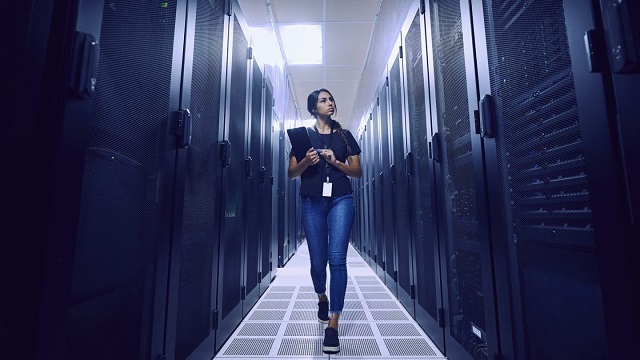Alberta
AI-driven data centre energy boom ‘open for business’ in Alberta

From the Canadian Energy Centre
By Deborah Jaremko and Will Gibson“These facilities need 24/7, super-reliable power, and there’s only one power generation fuel that has any hope of keeping up with the demand surge: natural gas”
Data centres – the industrial-scale technology complexes powering the world’s growing boom in artificial intelligence – require reliable, continuous energy. And a lot of it.
“Artificial Intelligence is the next big thing in energy, dominating discussions at all levels in companies, banks, investment funds and governments,” says Simon Flowers, chief analyst with energy consultancy Wood Mackenzie.
The International Energy Agency (IEA) projects that the power required globally by data centres could double in the next 18 months. It’s not surprising given a search query using AI consumes up to 10 times the energy as a regular search engine.
The IEA estimates more than 8,000 data centres now operate around the world, with about one-third located in the United States. About 300 centres operate in Canada.
It’s a growing opportunity in Alberta, where unlike anywhere else in the country, data centre operators can move more swiftly by “bringing their own power.”
In Alberta’s deregulated electricity market, large energy consumers like data centres can build the power supply they need by entering project agreements directly with electricity producers instead of relying solely on the power of the existing grid.
Between 2018 and 2023, data centres in Alberta generated approximately $1.3 billion in revenue, growing on average by about eight percent per year, lawyers with Calgary-based McMillan LLP wrote in July.
“Alberta has a long history of building complex, multi-billion-dollar infrastructure projects with success and AI data centres could be the next area of focus for this core competency,” McMillan’s Business Law Bulletin reported.
In recent years, companies such as Amazon and RBC have negotiated power purchase agreements for renewable energy to power local operations and data centres, while supporting the construction of some of the country’s largest renewable energy projects, McMillan noted.
While the majority of established data centres generally have clustered near telecommunications infrastructure, the next wave of projects is increasingly seeking sites with electricity infrastructure and availability of reliable power to keep their servers running.
The intermittent nature of wind and solar is challenging for growth in these projects, Rusty Braziel, executive chairman of Houston, Texas-based consultancy RBN Energy wrote in July
“These facilities need 24/7, super-reliable power, and there’s only one power generation fuel that has any hope of keeping up with the demand surge: natural gas,” Braziel said.
TC Energy chief operating officer Stan Chapman sees an opportunity for his company’s natural gas delivery in Canada and the United States.
“In Canada, there’s around 300 data centre operations today. We could see that load increasing by one to two gigawatts before the end of the decade,” Chapman said in a conference call with analysts on August 1.
“Never have I seen such strong prospects for North American natural gas demand growth,” CEO François Poirier added.
Alberta is Canada’s largest natural gas producer, and natural gas is the base of the province’s power grid, supplying about 60 percent of energy needs, followed by wind and solar at 27 percent.
“Given the heavy power requirements for AI data centres, developers will likely need to bring their own power to the table and some creative solutions will need to be considered in securing sufficient and reliable energy to fuel these projects,” McMillan’s law bulletin reported.
The Alberta Electric System Operator (AESO), which operates the province’s power grid, is working with at least six proposed data centre proposals, according to the latest public data.
“The companies that build and operate these centres have a long list of requirements, including reliable and affordable power, access to skilled labour and internet connectivity,” said Ryan Scholefield, the AESO’s manager of load forecasting and market analytics.
“The AESO is open for business and will work with any project that expresses an interest in coming to Alberta.”
Alberta
So Alberta, what’s next?

Albertans, not Ottawa, should shape Alberta’s future. The Alberta Next Panel is hitting the road to engage directly with Albertans and chart a path forward for the province.
Albertans are frustrated after 10 years of punitive policies, enacted by the federal government, attacking Alberta’s economy and targeting its core industries.
Chaired by Premier Danielle Smith, the Alberta Next panel will bring together a broad mix of leaders, experts, and community voices to gather input, discuss solutions, and provide feedback to government on how Alberta can better protect its interests, defend its economy, and assert its place in Confederation.
The panel will consult across the province over the summer and early fall to ensure that those living, working, doing business and raising families are the ones to drive Alberta’s future forward. The work will include identifying solutions advanced by Albertans on how to make Alberta stronger and more sovereign within a united Canada that respects and empowers the province to achieve its full potential. It will also include making recommendations to the government on potential referendum questions for Albertans to vote on in 2026.
It will consider and hear from Albertans on the risks and benefits of ideas like a establishing an Alberta Pension Plan, using an Alberta Provincial Police Service rather than the RCMP for community policing, whether Albertans should consider pursuing constitutional changes, which (if any) changes to federal transfer payments and equalization Albertans should demand of the federal government, potential immigration reform that would give the provincial government more oversight into who comes to the province, and changes to how Alberta collects personal income tax. Albertans will also have the opportunity to put forward their own ideas for discussion.
“This isn’t just about talk. It’s about action. The Alberta Next Panel is giving everyday Albertans a direct say in the direction of our province. It’s time to stand up to Ottawa’s overreach and make sure decisions about Alberta’s future are made here, by the people who live and work here.”
“Right now, there is a need to restore fairness and functionality in the country. Years of problematic policy and decisions from Ottawa have hurt Albertan and Canadian prosperity. I am honoured to be asked by Premier Smith to participate in the Alberta Next Panel. This panel is about listening to Albertans on how we build a stronger Alberta within a united Canada, to which I, and the Business Council of Alberta, are firmly committed.”
Chaired by Premier Danielle Smith, the panel includes 13 additional members, including elected officials, academics, business leaders and community advocates:
- Honourable Rebecca Schulz, Minister of Environment and Protected Areas of Alberta
- Brandon Lunty, MLA for Leduc-Beaumont
- Glenn van Dijken, MLA for Athabasca-Barrhead-Westlock
- Tara Sawyer, MLA-elect for Olds-Didsbury-Three Hills
- Bruce McDonald, former justice, Court of Appeal of Alberta
- Trevor Tombe, director of fiscal and economic policy, the University of Calgary School of Public Policy
- Adam Legge, president, Business Council of Alberta
- Andrew Judson, vice chairman (prairies), Fraser Institute
- Sumita Anand, vice president, Above and Beyond Care Services
- Melody Garner-Skiba, business and agricultural advocate
- Grant Fagerheim, president and CEO, Whitecap Resources Inc.
- Dr. Akin Osakuade, physician and section chief, Didsbury Hospital
- Dr. Benny Xu, community health expert
- Michael Binnion, president, Questerre Energy
Albertans have a choice: let Ottawa continue calling the shots—or come together to chart our own course. What’s next? You decide.
Key facts:
- Town hall dates and sites, along with other opportunities to participate in this engagement, are available online at Alberta.ca/Next. Exact locations will be posted in the weeks ahead of the event, and Albertans will be asked to RSVP online.
- The panel’s recommendations will be submitted to government by Dec. 31, 2025.
- It is anticipated that the panel will add additional members in the coming weeks.
Related information
Related news
 ]
]


Alberta
Alberta poll shows strong resistance to pornographic material in school libraries

From LifeSiteNews
A government survey revealed strong public support, particularly among parents, for restricting or banning sexually explicit books.
Albertans are largely opposed to their children viewing pornography in school libraries, according to government polling.
In a June 20 press release, the Government of Alberta announced that their public engagement survey, launched after the discovery of sexually explicit books in school libraries, found that Albertans strongly support removing or limiting such content.
“Parents, educators and Albertans in general want action to ensure children don’t have access to age-inappropriate materials in school libraries,” Demetrios Nicolaides, Minister of Education and Childcare, said.
“We will use this valuable input to guide the creation of a province-wide standard to ensure the policy reflects the priorities and values of Albertans,” he continued.
READ: Support for traditional family values surges in Alberta
The survey, conducted between May 28 to June 6, received nearly 80,000 responses, revealing a widespread interest in the issue.
While 61 percent of respondents said that they had never previously been concerned about children viewing sexually explicit content in libraries, most were opposed to young children viewing it. 34 percent said children should never be able to access sexually explicit content in school libraries, while 23 percent believed it should be restricted to those aged 15 and up.
Similarly, 44 percent of parents of school-aged children were supportive of government regulations to control content in school libraries. Additionally, 62 percent of respondents either agreed or strongly agreed that “parents and guardians should play a role in reporting or challenging the availability of materials with sexually explicit content in school libraries.”
READ: Alberta Conservatives seeking to ban sexually graphic books from school libraries
The polling results come after the Conservative Alberta government under Premier Danielle Smith announced that they are going ahead with plans to eventually ban books with sexually explicit as well as pornographic material, many of which contain LGBT and even pedophilic content, from all school libraries, on May 27.
At the time, Nicolaides revealed that it was “extremely concerning” to discover that sexually explicit books were available in school libraries.
The books in question, found at multiple school locations, are Gender Queer, a graphic novel by Maia Kobabe; Flamer, a graphic novel by Mike Curato; Blankets, a graphic novel by Craig Thompson; and Fun Home, a graphic novel by Alison Bechdel.
-

 Bruce Dowbiggin1 day ago
Bruce Dowbiggin1 day agoWhat Connor Should Say To Oilers: It’s Not You. It’s Me.
-

 Business1 day ago
Business1 day agoThe Passage of Bill C-5 Leaves the Conventional Energy Sector With as Many Questions as Answers
-

 Business1 day ago
Business1 day agoFederal fiscal anchor gives appearance of prudence, fails to back it up
-

 Business1 day ago
Business1 day agoCanada should already be an economic superpower. Why is Canada not doing better?
-

 Alberta1 day ago
Alberta1 day agoAlberta poll shows strong resistance to pornographic material in school libraries
-

 Crime1 day ago
Crime1 day agoFlorida rescues 60 missing kids in nation’s largest-ever operation
-

 Banks1 day ago
Banks1 day agoScrapping net-zero commitments step in right direction for Canadian Pension Plan
-

 Business11 hours ago
Business11 hours agoWhile China Hacks Canada, B.C. Sends Them a Billion-Dollar Ship Building Contract


